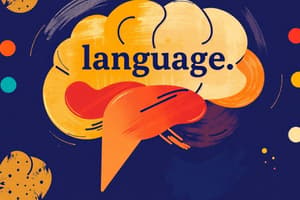Podcast
Questions and Answers
What does De Saussure's concept of arbitrariness in language imply?
What does De Saussure's concept of arbitrariness in language imply?
- The sounds of words provide direct clues to their meanings.
- The relationship between words and their meanings is natural.
- There is no inherent connection between signifiers and what they signify. (correct)
- Language is learned instinctively from birth.
Which statement accurately reflects the nature of language acquisition?
Which statement accurately reflects the nature of language acquisition?
- Language acquisition relies on cultural and social factors. (correct)
- All humans instinctively speak multiple languages.
- Language is instinctively understood by infants.
- Language is biologically determined at birth.
Which of the following is an example of a symbolic representation in language?
Which of the following is an example of a symbolic representation in language?
- Written letters forming a sentence.
- Adults mimicking infant sounds.
- A visual image of a dog representing the animal. (correct)
- The word 'dog' relating to a barking sound.
How many different languages are said to exist in the world today?
How many different languages are said to exist in the world today?
Which factor is NOT a reason for the evolution of language over time?
Which factor is NOT a reason for the evolution of language over time?
What is an example of an onomatopoeia mentioned in the content?
What is an example of an onomatopoeia mentioned in the content?
Which of the following statements about language is incorrect?
Which of the following statements about language is incorrect?
What does it mean when it is stated that language is symbolic?
What does it mean when it is stated that language is symbolic?
Which of the following statements accurately describes language as a symbolic system?
Which of the following statements accurately describes language as a symbolic system?
What does it mean for language to be systematic?
What does it mean for language to be systematic?
How does language serve a social function?
How does language serve a social function?
In what way is language connected to culture?
In what way is language connected to culture?
What role do phonemes play in language?
What role do phonemes play in language?
Which of the following reflects the idea that interaction is necessary for language learning?
Which of the following reflects the idea that interaction is necessary for language learning?
What aspect of language contributes to a person's social identity?
What aspect of language contributes to a person's social identity?
Which statement best defines the relationship between language and historical events?
Which statement best defines the relationship between language and historical events?
What is a primary reason that language is considered dynamic?
What is a primary reason that language is considered dynamic?
How is language primarily produced according to the content?
How is language primarily produced according to the content?
Which statement correctly describes language as meaningful?
Which statement correctly describes language as meaningful?
Why is language considered a uniquely human trait?
Why is language considered a uniquely human trait?
What happens to languages as their speakers die?
What happens to languages as their speakers die?
What role do new ideas and technologies play in language?
What role do new ideas and technologies play in language?
How do dictionaries adapt over time?
How do dictionaries adapt over time?
Which statement represents a misconception about language?
Which statement represents a misconception about language?
Flashcards are hidden until you start studying
Study Notes
Definition of Language
- Language is a system of symbols (spoken, written, or signed) used for human expression within social groups and cultures.
- Over 7000 languages exist worldwide, sharing fundamental characteristics despite their differences.
Key Characteristics of Language
Language is Arbitrary
- Language lacks a natural relationship between sound (signifier) and meaning (signified).
- Example: The word "dog" gives no clue to its meaning.
- Exceptions exist, such as onomatopoeias (e.g., "woof"), which represent sounds.
Language is Acquired and Not Instinctive
- Humans are not biologically pre-determined to speak a specific language; language is learned through exposure.
- Cultural and social environments dictate the language learned, influenced by family and community interactions.
- Language evolves over time due to factors such as technology and globalization.
Language is Symbolic
- Language consists of symbols that represent meanings, including spoken words, written text, and gestures.
- All human language systems use symbols to convey complex meanings through established rules.
Language is Systematic
- Each language has rules and conventions guiding communication and structure.
- Word order (e.g., subject-verb-object in English) and phonetic combinations define how languages operate.
- Predictable patterns exist within languages, despite variations in phonetic rules.
Language is Social
- Interaction with others is vital for language learning and usage.
- Language facilitates community engagement and reflects social identities and norms.
- Shared language among groups enhances cultural connections.
Language is Cultural
- Language serves as a medium for transmitting culture and historical narratives.
- Vocabulary and grammatical structures reveal cultural values and practices.
- Languages may possess unique words that encapsulate specific cultural beliefs.
Language is Dynamic
- Language changes continuously to accommodate societal needs and advancements.
- New words and expressions regularly emerge, showing adaptability to contemporary life.
- Language systems may face extinction as fading speakers vanish.
Language is Vocal
- The primary form of language involves vocalization produced by human physiological mechanisms.
- Writing emerged later as a means to represent vocal communication graphically.
Language is Meaningful
- Each language symbol carries semantic content, allowing for rich and varied meanings.
- Humans can assign multiple meanings to a single symbol while retaining understanding.
Language is Human
- Unique to humans, language allows sophisticated expression of abstract ideas, unlike animal communication.
- Unlike instinctive animal signals, human language is flexible and not limited to specific stimuli.
Studying That Suits You
Use AI to generate personalized quizzes and flashcards to suit your learning preferences.




